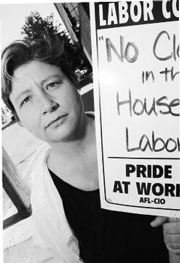Seattleite Ed Hunt was outed by some of his fellow union members during his first campaign for re-election as a union officer back in 1980: “Lots of anonymous fliers, [I was called] pinko, queer, the whole bit.” Hunt, who was a Boston resident at the time, beat his old-guard opponent despite the smear campaign. “Turned out that we had worked pretty diligently for our members, and despite the gay baiting, we won a landslide victory. It was quite gratifying.” That same year, Hunt was also outed by management as part of an anti-union effort. Similar stories replayed themselves in workplaces and unions throughout the country during the 1980s, according to Hunt.
This weekend in Everett, Hunt and his colleagues in Pride At Work—the first national labor organization for Gay, Lesbian, Bisexual, and Transgendered people, which Hunt helped found in 1991—are holding their fourth national convention, with the full support of both national and King County union leaders. One glance at this weekend’s schedule will confirm that queer labor activism has come a long way.
In addition to discrimination issues, Pride At Work is in the thick of labor struggles, like domestic partners’ access to pensions, and has been trying to inject union perspectives into national GLBT politics. This weekend’s Everett conference has workshops addressing not just workplace issues but also transgender rights, corporate globalization, a wide variety of types of discrimination, and sessions as varied as “Queers in Cuba” and “Immigration Challenges for LGBT Labor.” Featured speakers include San Francisco mayoral candidate and Board of Supervisors head Tom Ammiano; AFL-CIO Executive Vice President Linda Chavez-Thompson; and labor organizers from Brazil, South Africa, and Costa Rica. Pride At Work is now in the mainstream of the labor movement.
This is especially true in King County. Steve Williamson, head of the King County Labor Council, was a featured speaker at last year’s Pride rally. When he ducked his head into a local conference planning meeting last week, the enthusiasm he commanded from the other attendees was palpable. The most powerful labor leader in Western Washington is a strong and active GLBT ally.
Just as Pride At Work has matured nationally under the reform regime of AFL-CIO head John Sweeney, the local chapter, which calls itself Out Front Labor, has come into its own in the last two years with the Labor Council’s support.
Out Front claimed a major victory last year as one of the lead groups pushing for, and winning, recognition of domestic partner benefits for Washington state employees. It was also one of the key groups that successfully lobbied the City Council in 1999 when Seattle approved an ordinance requiring domestic partnership benefits for city contractors. Out Front emphasized making the benefits applicable to opposite-sex, as well as same-sex, couples. Says one of Out Front’s founders, Sarah Luthens, “I think it’s highly disturbing that some employers like Boeing and the state of Washington get public relations value out of offering domestic partnership benefits when they limit it to same-sex couples. It enforces this whole notion of traditional family—if you don’t have access to marriage, that’s the only reason why you wouldn’t do it— as opposed to expanding the notion of family. We want to survey all the unions and move them in that direction.”
Luthens estimates that Out Front currently has about 100 local members; they don’t necessarily have to belong to a union, though it is, of course, encouraged. “We’re oriented towards our grassroots base, that’s GLBT people,” Luthens explains. “But we definitely have a whole other constituency of pro-GLBT union people.” Particularly with the enthusiastic networking of Luthens, the group is a fairly constant presence in the area on issues ranging from confronting the leaders of the Boy Scouts about their policy of excluding gays to supporting strikers and working in coalitions with countless other activist groups.
Not all historic labor leaders have been hostile to queer rights; Cesar Chavez, Luthens notes, spoke at the 1987 Gay and Lesbian March on Washington. But it’s hard to imagine old-guard labor leaders like Lane Kirkland or George Meany helping to fund Pride At Work’s Everett convention. Times have changed.
“In the late ’70s and early ’80s,” says Hunt, “the old white guys would talk about fags and stuff. Now some of these guys are our biggest supporters.”
For information on the June 21-23 National Conference of LGBT Union Members & Allies, sponsored by Pride At Work, check www.prideatwork.org, or e-mail mames@aflcio.org. To contact the local Out Front Labor group, call 903-9488.








